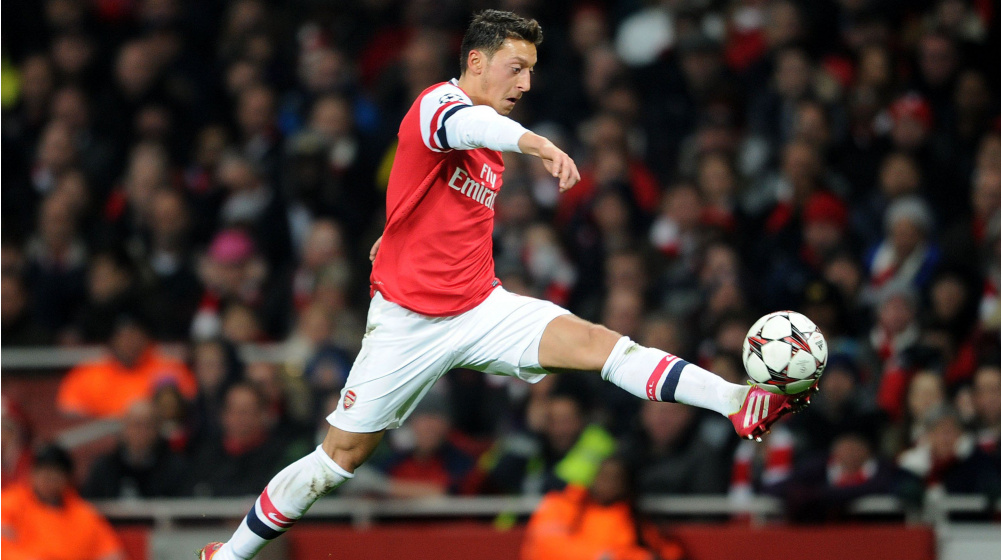Mesut Özil: The Maestro of Elegance and Vision
 In the realm of football, certain players transcend the boundaries of mere athleticism to embody artistry and elegance on the pitch. Mesut Özil, with his sublime vision, impeccable technique, and graceful style of play, stands as a testament to this notion. From his early days in Gelsenkirchen to his illustrious career on the global stage, Özil has captivated fans with his mastery of the beautiful game.
In the realm of football, certain players transcend the boundaries of mere athleticism to embody artistry and elegance on the pitch. Mesut Özil, with his sublime vision, impeccable technique, and graceful style of play, stands as a testament to this notion. From his early days in Gelsenkirchen to his illustrious career on the global stage, Özil has captivated fans with his mastery of the beautiful game.
The Early Years: From Gelsenkirchen to Madrid Born on October 15, 1988, in Gelsenkirchen, Germany, to Turkish parents, Mesut Özil showed prodigious talent from a young age. He honed his skills on the streets of his hometown before joining the youth academy of local club Schalke 04. It was here that Özil's potential began to blossom, catching the attention of scouts with his exceptional technique and vision.
Born on October 15, 1988, in Gelsenkirchen, Germany, to Turkish parents, Mesut Özil showed prodigious talent from a young age. He honed his skills on the streets of his hometown before joining the youth academy of local club Schalke 04. It was here that Özil's potential began to blossom, catching the attention of scouts with his exceptional technique and vision.
Özil's breakthrough came in 2006 when he joined Werder Bremen, where he quickly established himself as one of the Bundesliga's most exciting young talents. His ability to dictate the tempo of the game, combined with his effortless dribbling and incisive passing, earned him widespread acclaim and caught the eye of Europe's top clubs.
In 2010, Özil made the leap to the highest echelons of European football, signing for Spanish giants Real Madrid in a blockbuster transfer deal. Under the guidance of legendary coach José Mourinho, Özil flourished at the Santiago Bernabéu, forming a formidable partnership with Cristiano Ronaldo and contributing to Real Madrid's success both domestically and in Europe.
The Arsenal Years: Magician in North London In 2013, Özil made another high-profile move, this time to the English Premier League, joining Arsenal in a club-record transfer. His arrival at the Emirates Stadium heralded a new era of creativity and flair for the Gunners, with Özil quickly establishing himself as the focal point of the team's attacking play.
In 2013, Özil made another high-profile move, this time to the English Premier League, joining Arsenal in a club-record transfer. His arrival at the Emirates Stadium heralded a new era of creativity and flair for the Gunners, with Özil quickly establishing himself as the focal point of the team's attacking play.
Known for his vision, intelligence, and ability to unlock defenses with pinpoint passes, Özil became the architect of Arsenal's attacking movements, earning plaudits from fans and pundits alike. His partnership with the likes of Alexis Sánchez and Olivier Giroud produced some mesmerizing moments of footballing brilliance, as Özil showcased his unparalleled ability to see and execute passes that others could only dream of.
During his time at Arsenal, Özil won three FA Cups and etched his name into club folklore with his instrumental role in ending the team's trophy drought. His performances on the pitch earned him numerous individual accolades, including being named Arsenal's Player of the Season and earning a place in the PFA Team of the Year.
International Stardom: Glory with Die Mannschaft Özil's talent was not confined to the club level; he also left an indelible mark on the international stage as a key member of the German national team, affectionately known as Die Mannschaft. Making his debut in 2009, Özil quickly became an integral part of the German midfield, playing a pivotal role in the team's success at the 2010 FIFA World Cup in South Africa.
Özil's talent was not confined to the club level; he also left an indelible mark on the international stage as a key member of the German national team, affectionately known as Die Mannschaft. Making his debut in 2009, Özil quickly became an integral part of the German midfield, playing a pivotal role in the team's success at the 2010 FIFA World Cup in South Africa.
It was at the 2014 FIFA World Cup in Brazil, however, that Özil truly cemented his legacy as one of the game's great playmakers. His performances throughout the tournament were nothing short of sublime, as he orchestrated Germany's attacking play with poise and precision. In the final against Argentina, Özil provided the assist for Mario Götze's winning goal, helping Germany lift the coveted trophy for the fourth time in their history.
Challenges and Criticisms: The Price of Greatness Despite his undeniable talent and achievements on the pitch, Özil's career has not been without its challenges and controversies. In 2018, he found himself at the center of a media storm after a photograph emerged of him posing with Turkish President Recep Tayyip Erdoğan, leading to accusations of political involvement and divided loyalties.
Despite his undeniable talent and achievements on the pitch, Özil's career has not been without its challenges and controversies. In 2018, he found himself at the center of a media storm after a photograph emerged of him posing with Turkish President Recep Tayyip Erdoğan, leading to accusations of political involvement and divided loyalties.
The incident sparked a heated debate in Germany about identity, integration, and the role of athletes in politics, ultimately culminating in Özil's decision to retire from international football, citing discrimination and lack of support from the German Football Association (DFB). The episode cast a shadow over Özil's career and left a bitter taste for many fans, but it also highlighted the complexities of navigating fame and identity in the modern world.
On the pitch, Özil also faced scrutiny over his consistency and work rate, with some critics questioning his ability to influence games against top opposition. Despite flashes of brilliance, there were periods where Özil seemed to drift in and out of matches, leading to calls for him to adapt his playing style to suit the demands of the modern game.
Legacy and Impact: A Footballing Icon As Mesut Özil embarks on the next chapter of his career, having left Arsenal to join Fenerbahçe in Turkey, his legacy as one of football's most enigmatic talents remains secure. Whether it's his mesmerizing assists, his delicate touches, or his unrivaled vision on the pitch, Özil has left an indelible mark on the game, inspiring a generation of young players with his artistry and creativity.
As Mesut Özil embarks on the next chapter of his career, having left Arsenal to join Fenerbahçe in Turkey, his legacy as one of football's most enigmatic talents remains secure. Whether it's his mesmerizing assists, his delicate touches, or his unrivaled vision on the pitch, Özil has left an indelible mark on the game, inspiring a generation of young players with his artistry and creativity. Beyond his on-field exploits, Özil's philanthropy and humanitarian work have endeared him to fans around the world. From supporting charitable causes to advocating for social justice, Özil has used his platform to make a positive impact on society, embodying the values of empathy, compassion, and solidarity.
Beyond his on-field exploits, Özil's philanthropy and humanitarian work have endeared him to fans around the world. From supporting charitable causes to advocating for social justice, Özil has used his platform to make a positive impact on society, embodying the values of empathy, compassion, and solidarity.
In the annals of footballing history, Mesut Özil will be remembered not only for his sublime skills and achievements but also for his humanity and integrity. As a maestro of elegance and vision, Özil has left an indelible imprint on the beautiful game, reminding us that football is not just a sport but a form of artistry that transcends borders and unites people in joy and celebration.


















































